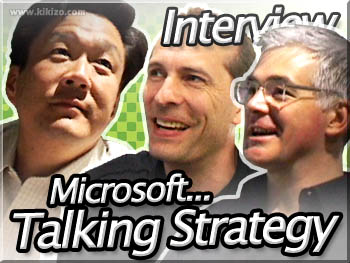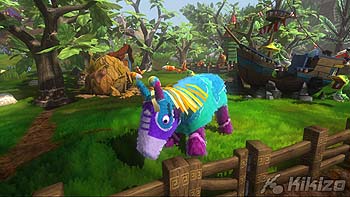Microsoft Interview Summer 2006
Microsoft bigwigs Shane Kim (the games guy), Todd Holmdahl (the product guy) and Richard Teversham (the marketing guy) take time out with us to talk in-depth about Xbox 360 strategy and plans for the future.
Things are looking pretty good for Microsoft right now. With the release of PlayStation 3 still some time away, a superb game line-up and an ever-improving hardware product, the company expects ten million gamers to be engrossed in the Xbox 360 experience by the time PS3 is scheduled to launch.

Our recent video interviews with Peter Moore and Scott Henson touched on a wide range of issues but there's still a whole lot more to talk about, and we get the answers we want in this new interview with three more of Xbox's most valuable ninjas.
Shane Kim is the head of Microsoft Game Studios and will be familiar to most of you already. Todd Holmdahl is a Corporate VP at the company who runs the Gaming and Xbox Product Group, responsible for developing the platform for both Xbox and Windows games, including the console, the accessories, all the software that goes on the console, and also the game developer group. Richard Teversham, meanwhile, is the director for marketing Xbox 360 in Europe, and also drives product strategy - Live, the platform, and the games.
A great mix of Xbots for a detailed interview, then. Enjoy...
![]()
Kikizo: Are you concerned about the momentum that the PlayStation 3 is building as its launch approaches?
Shane Kim: We know we have a better online history with Xbox Live, we have our Live Anywhere vision, and we know we have better content. Then you look at the exclusive game content coming from Microsoft Game Studios. I think we're very strong in content now, and we're also offering it at the better price point.
Kikizo: Do you think Xbox 360 users will be missing out without some sort of motion capabilities that are in rival controllers?
Todd Holmdahl: We're very proud of the controller that we developed. It's an award-winning controller. When we go and ask people about this product, among the things they say they love is the controller. We actually had a group that I was working on, several years ago, we came out with a tilt-based controller for PC games. It did not take off. It's not easy to use for most games. Most games today are developed with your small muscles in mind. They're easier to direct and easier to use. I don't think us NOT having a tilt is going to in any way affect us. You have to look at what Sony gave up to do this. They gave up rumble. If you go ask people what they'd rather have, rumble or tilt, they'll say rumble. There are a lot of unexplained things with that controller, in my mind.
Kikizo: Would Microsoft ever say, "This isn't working out, the vision isn't happening, let's drop it" like a few other ventures within Microsoft?
Richard Teversham: I've been thinking about this over the last few days, and I think the way we've been lucky is that, strategically, we've built Xbox with Live at the heart. And the building of our community is keeping us honest. They're basically saying just, "We need this! We need that!" And they're demanding a great lot of games on the platform. And if you think we're on version 6-7 of Live at the moment - that has been fueled by the community. We're not forcing technology. You could say that the box that's going to save Sony is forcing their technology on gamers. We're saying to them, here is a box, you do what you want with it. People are using it as a stereo, to play games, they're downloading stuff, they just do what they want with that box. They can choose HD-DVD. They can choose to have a wireless controller. We're not saying, "You've got to have a Microsoft this, and a Microsoft that." It's about personal choice, and I think that's where the difference is. We've been lucky enough to be consumer-focused. And I really believe that Sony now have become technology-focused, which, do the consumers want it or not, is untested.
Kikizo: For Sony, the battle is more than videogame consoles; it needs to establish Blu-ray.
Teversham: The question is, are they focusing more on getting an established, hi-def technology into the market, or are they more interested in making sure it's a gaming machine? I'm not answering that question, but I think it's a pivotal question for gamers to ask. From my point of view, I'll be sitting there as a gamer saying, I can buy next-gen today with 160 games coming out, franchises I love, key top games from top publishers, and I can buy that today, and save myself 200-odd... or I can wait, maybe it comes out in November, maybe it doesn't... and if it does, there will be too few units, and you won't get it until March or April. Do I pay that much more for the privilege of waiting an extra year? That's a decision gamers have to make. And you know what, I think it's a very simple decision.
Kikizo: Where do you think you are right now with the Japan situation?
Kim: We're committed to Japan for the long run, and we're off to a solid but not spectacular start, and I think that's what we expected to happen. That's why titles like Blue Dragon and Lost Odyssey from Sakaguchi-san are important to us. But you're starting to see very good and growing thirdparty support as well, when you look at the titles Capcom is releasing, for example. Konami and Namco and so forth are brining more and more titles. That's going to help us eventually in Japan, as well as the US and the world. I think our expectations are realistic; we don't expect to "win" in Japan, but I do think we can "win" the next generation.
Kikizo: So you're still absolutely dead set on being the global market leader?
Kim: I think we will be the market leader worldwide in terms of total installed base. Sony said themselves they'll be able to produce at most 4 million units by the end of the year. I know we're going to be the market leader going into this Christmas, and I know we're going to be the market leader coming out of this Christmas too. And I'm very confident that we can win this generation. That is our goal, that is our aspiration. We're going to have ten million units in the hands of customers before the competition even ships one into the channel. I'm very confident we can compete and keep moving forward. We think we can be the market leader, worldwide - even if we don't win in Japan.
Kikizo: So, potentially similar to the situation Sega had in the early Nineties - the Megadrive didn't sell that well in Japan yet it had a lot of support from Japanese developers?
Kim: I think any game publisher today, whether you're US, Japanese or European, you have to look at the worldwide market. One market alone is not big enough to sustain a commercial success because the games are getting too big now, too expensive to produce. Even if we're not the market leader in Japan, they look at the success that we're having in the US and Europe, because all of them have to take more of a worldwide perspective now.
Kikizo: Do you view Nintendo Wii as competition?
Kim: We have a tremendous amount of respect for Nintendo and truthfully, I hope they are successful, because expanding the market and bringing more people into the interactive entertainment industry is a good thing for everybody. But they're not really head-to-head competitors with us. They don't have the same kind of online vision that we do, with Live Anywhere, and they're not a HD gaming console either. So I don't think it would be fair to them, to say that they're head-to-head competitors with us.
Kikizo: Viva Piñata is targeting kids. Is that wise use of the Rare investment?
Kim: Rare has a unique position in our portfolio of development partners to target that broader demographic. They've got a legacy of success in that area, and I still believe in that space. So, a title like Viva Piñata - no respect to my friends at Epic working on Gears of War - but it's the most important game that we're going to release this year, because it is targeted at a broader demographic. And in order to win this generation, I know we have to appeal to a broader audience. Really, they're the best at producing titles for that audience, even though platformers in general may not be as popular as they once were, that doesn't mean there can't be breakthrough titles in that space.
Kikizo: You seem to be putting more into original IP than ever before.
Holmdahl: You don't have to be a big development studio to develop games for Live Arcade. I think probability says that when you have a lot of people out there, college kids, high schools kids, or people in their garage, they're all working on these ideas - that's when you start seeing the creative, genre-busting stuff. I love the sequel games we have coming, but we also need some fresh thinking in this space.
Certainly we do a very good job with the core gamers. You take a look at the games that are coming out this fall. But with respect to broadening, look at what you can do with Arcade, that allows you to play really interesting small games, it allows you to really tap into a broader marketplace. Then you start to take a look at games like Viva Piñata - clearly a game that's not a FPS, not in the core demographic, but it does take advantage of the platform - there's going to be a lot of trading between characters on Live, and I think it really rounds out the content we have. So when we come to this fall, this holiday, we're going to have 160 games. Those 160 games are gonna appeal to everybody. And that's what you need to do in order to have a very successful platform. And you're going to see us continue to push that in the future. It's paramount to what we're doing in our strategy. It's the right thing to do.
| Video Coverage (Latest Videos & Video FAQ) | |||
| PLEASE DO NOT DIRECT LINK TO ANY MEDIA FILE ON KIKIZO | |||
| Description | Dur. | Size | Details |
|
Live Anywhere Presentation of the cross-platform initiative Live Anywhere by Bill Gates and Scott Henson (Multi - Microsoft) |
07:33 | 117MB | DF, SD, 16:9 640x360p30 2.3Mbps |
|
Games for Windows Line-Up Direct feed montage including Conan, Flight Simulator X, Crysis. (PC - Microsoft) |
01:26 | 51MB | DF, ED, 16:9 852x480p60 5.2Mbps |
|
Xbox 360 Line-Up Direct feed montage of games for 2006. |
03:21 | 125MB | DF, ED, 16:9 852x480p60 5.2Mbps |
|
Xbox Live Arcade Line-Up Direct feed montage. |
00:51 | 30MB | DF, ED, 16:9 852x480p60 5.2Mbps |
|
Xbox Video Interview: Peter Moore Microsoft's VP of gaming in an extensive video interview. |
24:07 | 165MB | SD, 16:9 640x360p30 1Mbps |
|
Halo 3 Direct feed trailer (X360 - Microsoft) |
02:25 | 135MB | DF, HD, 16:9 1280x720p60 10Mbps |








 Satoru Iwata Video Interview - the late Nintendo president spoke with Kikizo in 2004 as 'Nintendo Revolution' loomed.
Satoru Iwata Video Interview - the late Nintendo president spoke with Kikizo in 2004 as 'Nintendo Revolution' loomed. Kaz Hirai Video Interview - the first of Kikizo's interviews with the man who went on to become global head of Sony.
Kaz Hirai Video Interview - the first of Kikizo's interviews with the man who went on to become global head of Sony. Ed Fries Video Interview - one of Xbox's founders discusses an epic journey from Excel to Xbox.
Ed Fries Video Interview - one of Xbox's founders discusses an epic journey from Excel to Xbox. Yu Suzuki, the Kikizo Interview - we spend time with one of gaming's most revered creators.
Yu Suzuki, the Kikizo Interview - we spend time with one of gaming's most revered creators. Tetris - The Making of an Icon: Alexey Pajitnov and Henk Rogers reveal the fascinating story behind Tetris
Tetris - The Making of an Icon: Alexey Pajitnov and Henk Rogers reveal the fascinating story behind Tetris Rare founders, Chris and Tim Stamper - their only interview? Genuinely 'rare' sit down with founders of the legendary studio.
Rare founders, Chris and Tim Stamper - their only interview? Genuinely 'rare' sit down with founders of the legendary studio. The History of First-Person Shooters - a retrospective, from Maze War to Modern Warfare
The History of First-Person Shooters - a retrospective, from Maze War to Modern Warfare